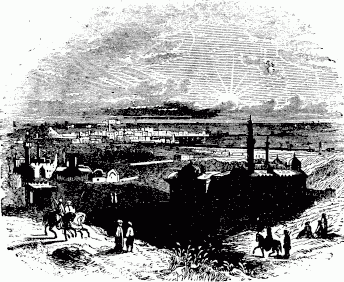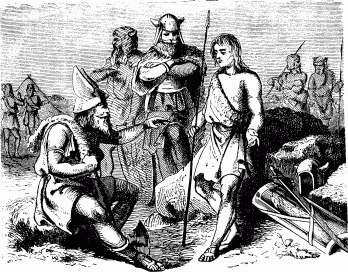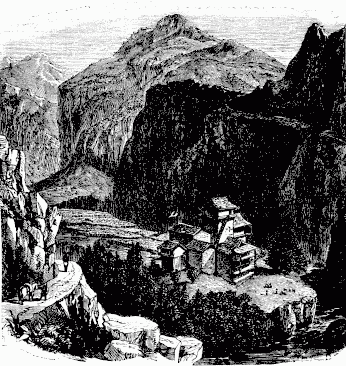
When Jovian died, the army chose another soldier named Valentinian, a stout, brave, rough man, with little education, rude and passionate, but a Catholic Christian. As soon as he reached Constantinople, he divided the empire with his brother Valens, whom he left to rule the East, while he himself went to govern the West, chiefly from Milan, for the Emperors were not fond of living at Rome, partly because the remains of the Senate interfered with their full grandeur, and partly because there were old customs that were inconvenient to a Christian Emperor. He was in general just and honest in his dealings, but when he was angry he could be cruel, and it is said he had two bears to whom criminals were thrown. His brother Valens was a weaker and less able man, and was an Arian, who banished Athanasius once more for the fifth time; but the Church of Alexandria prevailed, and he was allowed to remain and die in peace. The Creed that bears his name is not thought to be of his writing, but to convey what he taught. There was great talk at this time all over the cities about the questions between the Catholics and Arians, and good men were shocked by hearing the holiest mysteries of the faith gossiped about by the idlers in baths and market-places.

At this time Damasus, the Pope, desired a very learned deacon of his church, named Jerome, to make a good translation of the whole of the Scriptures into Latin, comparing the best versions, and giving an account of the books. For this purpose Jerome went to the Holy Land, and lived in a cell at Bethlehem, happy to be out of the way of the quarrels at Rome and Constantinople. There, too, was made the first translation of the Gospels into one of the Teutonic languages, namely, the Gothic. The Goths were a great people, of the same Teutonic race as the Germans, Franks, and Saxons—tall, fair, brave, strong, and handsome—and were at this time living on the north bank of the Danube. Many of their young men hired themselves to fight as soldiers in the Roman army; and they were learning Christianity, but only as Arians. It was for them that their Bishop Ulfilas translated the Gospels into Gothic, and invented an alphabet to write them in. A copy of this translation is still to be seen at Upsal in Sweden, written on purple vellum in silver letters.

Another great and holy man of this time was Ambrose, the Archbishop of Milan, who was the guide and teacher of Gratian, Valentinian's eldest son, a good and promising youth so far as he went, but who, after the habit of the time, was waiting to be baptized till he should be further on in life. Valentinian's second wife was named Justina; and when he died, as it is said, from breaking a blood-vessel in a fit of rage, in 375, the Western Empire was shared between her little son Valentinian and Gratian.
Justina was an Arian, and wanted to have a church in Milan where she could worship without ascribing full honor and glory to God the Son; but Ambrose felt that the churches were his Master's, not his own to be given away, and filled the Church with Christians, who watched there chanting Psalms day and night, while the soldiers Justina sent to turn them out joined them, and sang and prayed with them.
Gratian did not choose to be called Pontifex Maximus, or chief priest of all the Roman idols, as all the Emperors had been; and this offended many persons. A general named Maximus rose and reigned as Emperor in Britain, and Gratian had too much on his hands in the north to put him down.
In the meantime, a terrible wild tribe called Huns were coming from the West and driving the Goths before them, so that they asked leave from Valens to come across the Danube and settle themselves in Thrace. The reply was so ill managed by Valens' counsellors that the Goths were offended, and came over the river as foes when they might have come as friends; and Valens was killed in battle with them at Adrianople in 378.
Gratian felt that he alone could not cope with the dangers that beset the empire, and his brother was still a child, so he gave the Eastern Empire to a brave and noble Spanish general named Theodosius, who was a Catholic Christian and baptized, and who made peace with the Goths, gave them settlements, and took their young men into his armies. In the meantime, Maximus was growing more powerful in Britain, and Gratian, who chiefly lived in Gaul, was disliked by the soldiers especially for making friends with the young Gothic chief Alaric, whom he joined in hunting in the forests of Gaul in a way they thought unworthy of an Emperor. Finding that he was thus disliked, Maximus crossed the Channel to attack him. His soldiers would not march against the British legions, and he was taken and put to death, bitterly lamenting that he had so long deferred his baptism till now it was denied to him.
Young Valentinian went on reigning at Milan, and Maximus in Gaul. This last had become a Christian and a Catholic in name, but without laying aside his fierceness and cruelty, so that, when some heretics were brought before him, he had them put to death, entirely against the advice of the great Saint and Bishop then working in Gaul, Martin of Tours, and likewise of St. Ambrose, who had been sent by Valentinian to make peace with the Gallic tyrant.
It was a time of great men in the Church. In Africa a very great man had risen up, St. Augustine, who, after doubting long and living a life of sin, was drawn to the truth by the prayers of his good mother Monica, and, when studying in Italy, listened to St. Ambrose, and became a hearty believer and maintainer of all that was good. He became Bishop of Hippo in Africa.

But with the good there was much of evil. All the old cities, and especially Rome, were full of a strange mixture of Christian show and heathen vice. There was such idleness and luxury in the towns that hardly any Romans had hardihood enough to go out to fight their own battles, but hired Goths, Germans, Gauls, and Moors; and these learned their ways of warfare, and used them in their turn against the Romans themselves. Nothing was so much run after as the games in the amphitheatres. People rushed there to watch the chariot races, and went perfectly wild with eagerness about the drivers whose colors they wore; and even the gladiator games were not done away with by Christianity, although these sports were continually preached against by the clergy, and no really devout person would go to the theatres. Much time was idled away at the baths, which were the place for talk and gossip, and where there was a soft steamy air which was enough to take away all manhood and resolution. The ladies' dresses were exceedingly expensive and absurd, and the whole way of living quite as sumptuous and helpless as in the times of heathenism. Good people tried to live apart. More than ever became monks and hermits; and a number of ladies, who had been much struck with St. Jerome's teaching, made up a sort of society at Rome which busied itself in good works and devotion. Two of the ladies, a mother and daughter, followed him to the Holy Land, and dwelt in a convent at Bethlehem.
Maximus after a time advanced into Italy, and Valentinian fled to ask the help of Theodosius, who came with an army, defeated and slew Maximus, and restored Valentinian, but only for a short time, for the poor youth was soon murdered by a Frank chief in his own service named Arbogastes.